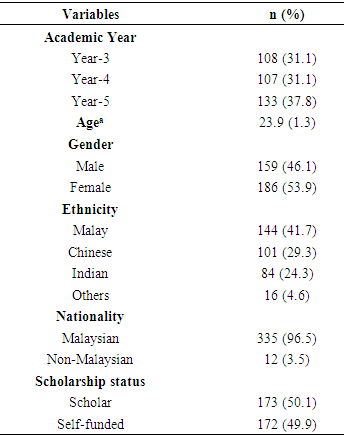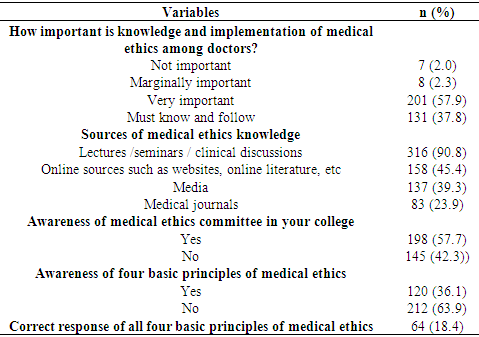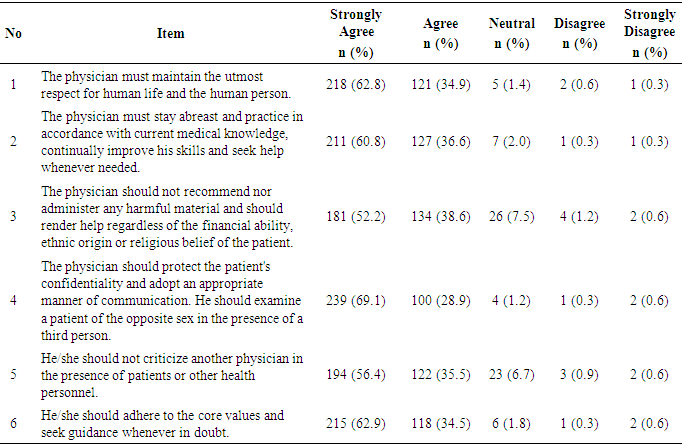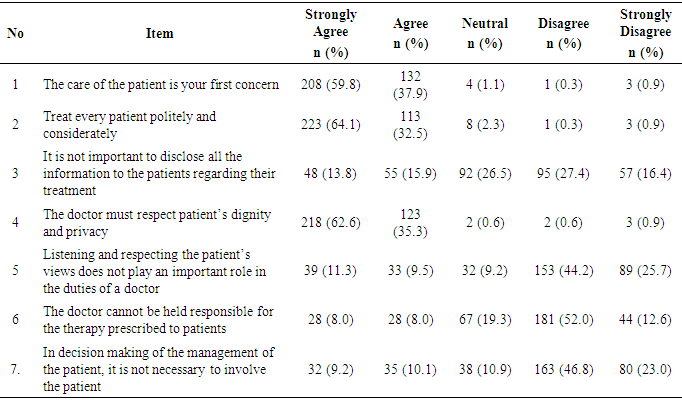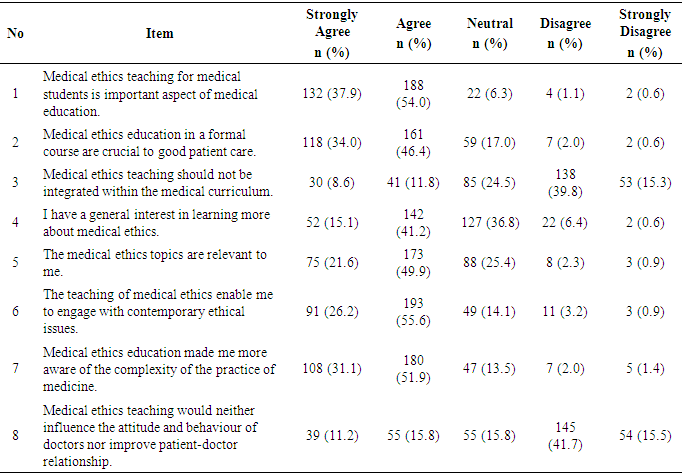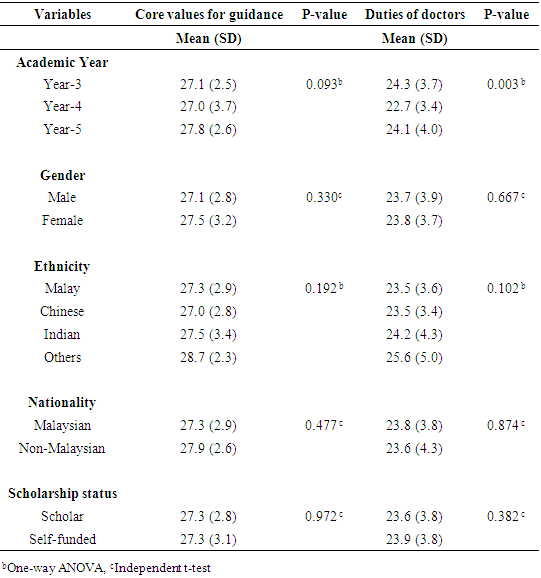-
Paper Information
- Paper Submission
-
Journal Information
- About This Journal
- Editorial Board
- Current Issue
- Archive
- Author Guidelines
- Contact Us
Education
p-ISSN: 2162-9463 e-ISSN: 2162-8467
2018; 8(3): 48-53
doi:10.5923/j.edu.20180803.03

A Survey on Knowledge and Attitudes towards Medical Ethics among Undergraduate Medical Students
Sunil Kumar Jatana1, Htoo Htoo Kyaw Soe2, Khine Lynn Phyu1, Htay Lwin2, Nan Nitra Than2
1Departments of Paediatric, Faculty of Medicine, Melaka-Manipal Medical College (Manipal Academy of Higher Education (MAHE)), Melaka, Manalysia
2Community Medicine, Faculty of Medicine, Melaka-Manipal Medical College (Manipal Academy of Higher Education (MAHE)), Melaka, Manalysia
Correspondence to: Htoo Htoo Kyaw Soe, Community Medicine, Faculty of Medicine, Melaka-Manipal Medical College (Manipal Academy of Higher Education (MAHE)), Melaka, Manalysia.
| Email: |  |
Copyright © 2018 The Author(s). Published by Scientific & Academic Publishing.
This work is licensed under the Creative Commons Attribution International License (CC BY).
http://creativecommons.org/licenses/by/4.0/

Knowledge of Medical ethics is mandatory for all healthcare professionals but it is not included as a part of MBBS curriculum in many medical colleges. Hence, a cross-sectional study was conducted in a private medical college in Malaysia to gauge the extent of knowledge, awareness and attitude of undergraduate medical students of different seniority and from different socio-demographic backgrounds, towards medical ethics. A total of 348 undergraduate medical students voluntarily participated in the study. A structured questionnaire including awareness of principles of medical ethics, attitudes towards core values for guidance, attitudes regards to duties of doctors towards patients and attitudes towards learning medical ethics in curriculum, was distributed to the students. Five points Likert scale (strongly agree, agree, neutral, disagree, and strongly disagree) was used to assess the attitudes. Independent t-test and one-way ANOVA was used to determine the relationship between sociodemographic characteristics and attitudes regards to medical ethics. Among the participants, 31.0% were year-3, 30.7% year-4 and 38.2% year-5 students. 37.8% of the students stated doctors must follow medical ethics and 57.9% said it was very important. Majority of the students received medical ethics knowledge from lectures, seminars and clinical discussions during their clinical years while 45.4% received from online sources, 39.3% from media and 23.8% from medical journals. 36.1% were aware of four basic principles of medical ethics, but only 18.4% knew what the principles were. There was no significant difference of attitude scores regarding core values for guidance of doctors and duties of doctors towards patients between genders, ethnicities, nationalities and scholarship statuses. But year-4 students had significantly lower attitude score regards to duties of doctors towards patients (mean score of 22.7 (SD 3.4)) than year-3 and year-5 which had mean score of 24.3 (SD 3.7) and 24.1 (SD 4.0) respectively. In conclusion, the undergraduate medical students had a reasonable knowledge and positive attitude towards medical ethics across all socio-demographic background though attitude of doctors towards patients differed according to seniority of students. However, the teaching of medical ethics should be part of the medical curriculum to strengthen these attitudes and to expose the students to the training classes using real case scenarios, workshops and seminars on medical ethics so that once they become doctors, they are not found wanting in dealing with ethical issues.
Keywords: Knowledge, Attitudes, Medical ethics, Medical student, Survey
Cite this paper: Sunil Kumar Jatana, Htoo Htoo Kyaw Soe, Khine Lynn Phyu, Htay Lwin, Nan Nitra Than, A Survey on Knowledge and Attitudes towards Medical Ethics among Undergraduate Medical Students, Education, Vol. 8 No. 3, 2018, pp. 48-53. doi: 10.5923/j.edu.20180803.03.
Article Outline
1. Introduction
- Knowledge and practice of Medical ethics by healthcare professionals is an extremely important issue in today’s highly sophisticated and expensive medical treatment. To put it simply, medical ethics is nothing but the application of moral values and principles to the practice of medicine and its origin in Western history can be traced back to early Christian teachings and Hippocratic Oath. When we consider medical ethics, four principles form the basis of ethical medical practice, namely, autonomy, justice, beneficence, and non-maleficence [1, 2]. Unfortunately, not much stress is laid on imparting knowledge of medical ethics to undergraduate students in a medical college, where the attitude and knowledge in various fields of medicine take root among future doctors. It is expected that all doctors in medical practice should be aware of issues in medical ethics lest they are dragged to the court and face litigation for non-adherence to basic principles of medical practice.At present, in our college, the medical students are exposed to medical ethics topics during clinical postings. But the student’s knowledge and attitudes towards medical ethics had never been evaluated. Hence, we conducted this study to assess the knowledge, awareness, and attitudes of medical ethics among Bachelor of Medicine and Bachelor of Surgery (M.B.B.S) students of a private medical college in Malaysia.
2. Methods
- We conducted a cross-sectional study from June-October 2017 among medical undergraduate students who were attending clinical year (3rd, 4th and 5th academic years) in a private medical college in Malaysia. The sample size was calculated using the formula for estimating single population proportion with the margin of error 5%, the assumption of 95% confidence level and 31.1% of positive about importance of medical ethics [3, 4]. The minimum sample size required was 330. We expected 20% non-response; therefore, we selected 413 students. We used purposive sampling and included all students who were attending class on the day of data collection and willing to provide written informed consent. 348 students provided written informed consent and they were included in this study. In our study, confidentiality was maintained and anonymity of respondents was ensured. In addition, data were kept secured and available only to the statistician. This study was approved by Research Ethics Committee of our college.Three authors (SKJ, KLP & HL) distributed the questionnaire to the clinical year students during their clinical posting. Before data collection, the purpose of the study was explained to the respondents. Participation was strictly voluntary and autonomy of the respondents was respected. Written informed consent was taken from each participant. Self-administered method for data collection was used and the students were given instruction if they agreed to participate in this study. A structured questionnaire on knowledge of principles of medical ethics, attitudes towards core values for guidance, attitudes regards to duties of doctors towards patients, attitudes towards learning medical ethics in the curriculum was distributed to the students. The questionnaire also included socio-demographic characteristics of students such as academic year, age, gender, ethnicity, nationality, scholarship status. Attitudes towards core values for guidance and attitudes of duties of doctors towards patients consisted of 13 items including nine positive and four negative statements. Attitudes towards learning medical ethics in curriculum consisted of eight items, which included six positive and two negative statements. Five points Likert scale such as strongly agree (5), agree (4), neutral (3), disagree (2), and strongly disagree (1) was used to assess the attitudes towards medical ethics. For positive items, strongly agree was scored five and strongly disagree was scored one while for negative items, strongly agree was scored one and strongly disagree was scored five. Content validity was checked with six experts. Face validity was checked with 10 students in three aspects such as clarity of the wording, likelihood the target audience would be able to answer the questions, and layout and style acceptable. The students did not reveal any problems in understanding and answering the items. We carried out a pilot study with 30 convenience sample to assess internal consistency. The Cronbach’s alpha coefficient of attitudes towards core values for guidance was 0.873, attitudes regard to duties of doctors towards patients was 0.605 and attitudes towards learning medical ethics in the curriculum was 0.641.After checking and coding the questionnaire, data was entered into Microsoft Excel and accuracy of data was checked. Data were analysed using SPSS version 12 (SPSS Inc, Chicago, IL). Three authors (KLP, HL & NNT) entered the data and the author (HHKS) analysed the data. Regarding attitudes, the total score was computed by taking the sum. For quantitative variables, mean and standard deviation were described while for qualitative variables, frequency and percentage were calculated. Independent t-test and one-way ANOVA were used to determine the relationship between sociodemographic characteristics and attitudes. All the statistical tests were two-sided and the level of significance was set at 0.05.
3. Results
- A total of 348 undergraduate medical students participated in this study (response rate 84.3%), which included 108 (31.0%) year-3, 107 (30.7%) year-4 and 133 (38.2%) year-5 students. The mean age was 23.9 years (SD 1.3) and 53.9% of the students were female. 41.7% of them were Malay while 29.3% were Chinese and 24.3% were of Indian origin. Majority of the participants (96.5%) were Malaysian nationality while only 23 students (3.5%) were from foreign countries. About half of the students (50.1%) received scholarship while 49.9% were self-funded (Table 1: Appendix).Table 2 shows that 37.8% of the students stated medical ethics must be followed by doctors and 57.9% said it was very important. Majority of the students received medical ethics knowledge from lectures, seminars, and clinical discussions during their clinical years while 45.4% received from online sources, 39.3% from media and 23.8% from medical journals. 57.7% of the respondents were aware of college’s medical ethics committee. 36.1% were aware of four basic principles of medical ethics, however, only 18.4% had the correct response regarding all four basic principles (Table 2: Appendix).Tables 3, 4 and 5 shows attitudes of medical students towards core values for guidance (Table 3: Appendix), duties of doctors towards patients (Table 4: Appendix) and learning medical ethics in curriculum (Table 5: Appendix). Majority of the students had positive attitudes towards core values for the guidance of doctors, physician’s duties towards patients including respect, confidentiality and consent, and towards learning medical ethics in the curriculum.The relationship between socio-demographic characteristics and attitudes towards medical ethics among medical students is shown in table 6. Regarding attitudes of medical students towards core values for guidance, there was no significant difference in attitude scores between genders, ethnicities, nationalities and scholarship statuses. However, attitude score regards to duties of doctors towards patients was significantly different between academic years as year-4 had lower mean score of 22.7 (SD 3.4) than year-3 and year-5 which had mean scores of 24.3 (SD 3.7) and 24.1 (SD 4.0) respectively (P value = 0.003). There was also no significant relationship between attitudes regarding duties of doctors towards patients and other socio-demographic characteristics such as gender, ethnicity, nationality and scholarship status. (Table 6: Appendix)
4. Discussion
- The term ‘Medical Ethics’ is attributed to the English physician Thomas Percival, who in the year 1803 first published the expectations and requirements of a member of the medical profession. It is based on a set of values that healthcare professionals can lean on in case of conflict or confusion and includes the four main principles [1]. In this era of modern medicine where the cost of medical treatment is escalating, knowledge of medical ethics is a pre-requisite for medical practice. This should ideally start from the ‘cradle’ of doctors i.e. the medical school. Unfortunately, very few studies on evaluating knowledge of medical ethics in undergraduate medical students is found in the literature.This study aimed to evaluate the awareness and attitudes of medical ethics amongst students in a reputed private medical college in Malaysia and if required to give recommendations for medical ethics classes in the MBBS curriculum. In our study, the response rate was 84.3% which reflects the positive attitudes of students towards medical ethics. A large number of students (57.9%) stated that knowledge and implementation of medical ethics were very important amongst doctors, while only 2% stated that it is unimportant. Similar findings was observed by Chatterjee B and Sarkar J [4] and Walrond ER et al [5] while in the study by Acharya RP and Shakya YL [6], 91.3% of the medical interns considered medical ethics to be important. About the awareness of four basic principles of medical ethics, 63.9% of the students were not aware of the same and only 18.4% students could give the correct response to all the principles. Lee JK and colleagues [7] assessed awareness and understanding of ethical issues commonly encountered in the ambulatory setting among medical students interns and residents. The authors designed a questionnaire to evaluate general knowledge of medical ethics using 12 clinical vignettes and the respondents were asked whether an ethical issue was present, its significance and what specific issues were involved. It was shown that the medical students, interns, and residents had insufficient knowledge to recognize ethical dilemmas in the ambulatory setting.Majority of the students (90.8%) mentioned that the source of their knowledge was from lectures/seminars/clinical discussions, while 45.4% derived the knowledge from online literature and medical journals (23.9%) as well. In the study by Ramesh Acharya and colleagues [6] source of knowledge for students was (35.7%) from lectures/seminars, (24.5%) on the job, (21.4%) training and (17.3%) own reading while Chatterjee B and Sarkar J [4] observed that 54.7% students gained knowledge from classroom lectures and 47.8% from books. In a study by Tahir S and colleagues [8], a high percentage (36%) had never heard of bioethics. Moreover, the students were asked about their attitudes towards core values for the guidance of doctors and duties of doctors towards their patients including respect, confidentiality and consent. We found that majority of the students had a positive attitude towards these aspects and more than 80% of the students either strongly agreed or agreed with these values. Only a minority of students disagreed or strongly disagreed with the same (1-4%) while a small percentage of students remained neutral. The previous study done among the medical undergraduate interns also showed that the majority of the participants had positive attitudes towards autonomy, paternalism, justice, and confidentiality [6]. This study also shows that socio-demographic pattern had no significant relationship with the attitudes towards core values for the guidance, and the attitudes of duties of doctors towards their patients regardless of gender, ethnicity, religion, nationality or scholarship status. Our finding was similar to the previous study done by Chatterjee B and Sarkar J [4]. However, attitude score of duties of doctors towards the patients was significantly different between academic years as year-4 had the lower mean score of 22.7 (SD3.4) than year-3 and year-5 which had a mean score of 24.1 (SD 4.0) and 24.3 (SD3.7) respectively. Khizar B and Iqbal M [9] noted that both knowledge and attitudes regarding medical ethics are variable and may be strongly influenced by local religious, cultural and socioeconomic factors. Currently, in our college, the medical students are exposed to medical ethics topics during clinical postings and are encouraged and given time to do self-study on medical ethics. Rabbani MW and colleagues [10] compared knowledge and awareness of medical ethics in medical graduates of two medical colleges in Pakistan. They observed that the students who were taught medical ethics in medical college were better informed than students who did not get the formal education in undergraduate medical training. Similar observation was seen by Keeselheim J and colleagues [11], who conducted a study amongst paediatric medical residents. They found that medical ethics and professionalism, if included in curricula, can more consistently influence paediatricians’ knowledge. Hence, from all the studies it is evident that medical ethics should be a part of the curriculum for undergraduate medical students. The students should be provided with training classes, workshops, and seminar to make the doctors who are confident to address ethical dilemma and to adopt ethical principles. There are few limitations in our study. As this study was conducted in one private medical college, the findings cannot be generalized to other settings. This was a cross-sectional study, therefore, we could neither observe the changes over time nor inference of causality. Moreover, larger studies are required to ascertain the extent of knowledge amongst medical students of doctor-patient relationship and duties of doctors towards their peers, seniors, and juniors.
5. Conclusions
- The attitude towards medical ethics including core values for the guidance of doctors, physician’s duties towards patients including respect, and confidentiality and consent among the students of our medical college was satisfactory though many students were deficient of knowledge regards to four basic principles. The students attained knowledge of medical ethics from various sources, yet it requires further reinforcement in the undergraduate medical curriculum.
ACKNOWLEDGEMENTS
- We would like to thank the medical students who participated in this study. We would like to extend our sincere gratitude to the management of Melaka-Manipal Medical College (MMMC) and Research Ethics Committee, Faculty of Medicine (MMMC) to grant the approval of this study.
Appendix
|
|
|
|
|
|
 Abstract
Abstract Reference
Reference Full-Text PDF
Full-Text PDF Full-text HTML
Full-text HTML